|

by Bernice H. Hill, Ph.D.
Exopolitics Journal
vol. 3, no. 2
July 2009
from
ExopoliticsJournal Website
|
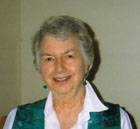 About the Author About the Author
Bernice H. Hill,
Ph.D., is a Jungian Analyst in private practice in
Boulder, Colorado; member of the International
Association of Analytic Psychology (Zurich) and a senior
training analyst for the C. G. Jung Institute of
Colorado. She has presented seminars on UFOs and
extraterrestrials to mental health professionals and the
public in Colorado Springs, Denver and Boulder.
Her
prior experiences include being a chemist for the
Canadian Dept. of Defense, studying the effects of
irradiation on biological materials. She currently
serves as a Public Outreach Advisor on the Exopolitics
Institute |
Abstract
It is time for Exopolitics to consider the impact of disclosure on
religious institutions.
In a fast changing world recent trends,
especially in the United States, show major perceptual shifts that
are affecting all public sectors including religion. Growing
multiculturalism, liberalization of thought and interfaith
communication (particularly stimulated by terrorist attacks) are
pushing for a more open, flexible and socially conscious
perspective.
These movements suggest that Exopolitics
could now begin to consider strategies for intervention.
1.
Introduction
One of the main reasons given for the lack of disclosure of the
reality of extraterrestrials during the Cold War was that it was
essential to protect the technological advantage held by the West.
While this is no longer the case, disclosure has continued to be
blocked for the fear of cultural chaos.
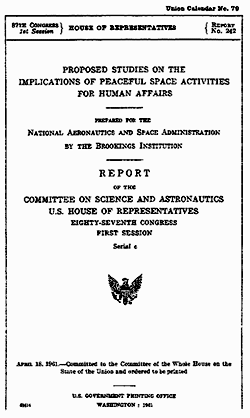
What is often sighted to
support this is the
1961 Brookings Institute Report commissioned by
NASA.
This Report said:
Evidence of extraterrestrial existence might also be found in
artifacts left on the moon or other planets. The consequences for
attitudes and values are unpredictable, but would vary profoundly in
different cultures and between groups within complex societies; a
crucial factor would be the nature of communication between us and
the other beings.
Devastating societal effects could result from contact with more
technologically advanced off world societies.
Anthropological files contain many examples of societies, sure of
their place in the universe, which have disintegrated when they had
to associate with previously unfamiliar societies espousing
different ideas and different life ways; others that survived such
an experience usually did so by paying the price of changes in
values and attitudes and behaviors.[1]
One can imagine the cultural pressure felt by the North American
Indians with the advent of the white man and his relentless
expansion.
As they watched their land being claimed, the buffalo
being slaughtered and their peopled hunted, they certainly
experienced the disintegration of their old ways of knowing.
Similarly in Meso-America, with the arrival of the Spanish, a
culture that had existed for hundreds of years collapsed in a few
decades.
The Brookings Report is correct, such encounters can be
destructive and threaten the very coherence of a people.
No where in a culture is the issue of coherence more sacred than
within its religious institutions. They provide stability and
identity and their beliefs set the tone for community membership and
personal meaning. Religion can define a person’s reality.
If
disclosure puts all our social structures at risk, our religious
institutions will be particularly vulnerable. However, perhaps its
time for an examination of this premise. We already live in a fast
changing world: a pluralistic modern world, made smaller by our
planes and our communication systems. Many of our old world views
are dying; new understandings and perceptions are beginning to
emerge.
Recently,
Neil Freer sent out a strong note to the
Exopolitcs
community which included these comments:
Clearly the enabling and promotion of intelligent, confident,
mature, peaceful and expansive participation in stable society is
the goal and vision of exopolitics.
If we truly wish to qualify for
stellar society by becoming an evolved, peaceful, unified species
beyond tribe, national culture, civilization, we are going to have
to deal with the religions. Is there some sort of exopolitical
incorrectness in even re-inspecting and questioning the
religions?” [2]
This is a worthy challenge.
It raised for me these questions:
-
What
are the issues that Exopolitics needs to understand about religious
institutions at this time?
-
What is the potential for evolution
in religions that Exopolitics’ could benefit from when considering
policy issues?
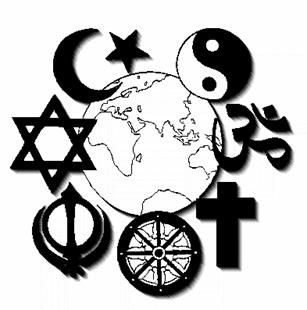 2. The Global
Overview 2. The Global
Overview
Currently the distribution of world religions is as follows:
-
christianity 2.1 billion people 33%
-
islam 1.5 billion 21%
-
secular/non religious 1.1 billion 16%
-
hinduism 900 million 14%
-
chinese traditional 394 million 6%
-
buddhism 376 million 6%
-
primal-indigenous 300 million 6%
-
african traditional 100 million 2% [3]
The fastest growing religion in the world to-day is
islam. In part,
this is attributed to the high birth rate in third world countries,
many of which are Islamic. It is
projected that by 2025 there will
be 2 billion muslims and 3 billion christians. muslims will surpass christians by 2200.[4]
Across the world there is a steady increase in multiculturalism,
especially in the West.
This movement will provide increased
opportunities for people to encounter, dialogue and understand those
of other religions. There will also be an increase in polarization
as some people hang on more tightly to their boundaries and
identifications.
One could speculate that the growing populations of China and India
will be more at ease with disclosure, not having the monotheistic
religions found in the West. Oriental philosophies (i.e. in India:
hinduism, jainism, buddhism) are, by their nature, open to ideas of
reincarnation and
multidimensionality... Extraterrestrial stories,
such as
the vimanas aircraft and cosmic conflict, are buried in
Vedic mythology.
Those of secular beliefs in China would probably be
most convinced by the abundance of “nuts and bolts” evidence
gathered by whistleblowers and those with scientific credentials.
Given the potential for growth of the muslim faith the impact of
disclosure on this faith needs to be explored. There are great
variations within the muslim religion; it is often colored by the
underlying beliefs of the countries in which it is found. Bassett
has noted that disclosure may be particularly difficult for islam as
well as Judaism.[5]
The increasing importance given to human
consciousness in the overall reaction to disclosure and its
relationship to power-politics makes such a study especially
important.[6]
The predominant world religion at this time, however, is
christianity. In all its various forms it is the bulwark behind the
major Western social structures and it is this worldview, which will
bear the brunt of disclosure. Of the christian population in the
world, 60% are non-white and living outside Europe and America. The
growth of christianity in these areas is attributed to the
evangelical Protestant movement in Africa, Asia and Latin
America.[7]
While the attitudes towards extraterrestrials may be constrained by
traditional christian religious views in these countries they will
also be informed by their earlier indigenous cultural beliefs. The
indigenous cultures around the world (6%) find within their
mythology an acceptance of the star visitors. For example, it is
well known that those in Mexico are quite open to the
extraterrestrial reality and there have been numerous sightings
there by thousands of people.
The Vatican position on extraterrestrials would also support this
acceptance. Bassett has pointed out that for centuries the catholic
church has been gathering information on extraterrestrials from
its archives, its astronomers and its priests.[8]
Harris’s
interviews with Monsignor Corrado Balducci, (former Vatican Nuncio
to Washington, DC) and then with Father Gabriel Funes, (Director of
the Vatican’s observatory in Castel Gandolfo) confirms this.
Father Funes (2008) is quoted as saying that ruling out the existence of
aliens would be like putting limits on God’s creative freedom.[9]
3. United
States
3(i)
Cultural liberalization
The powerful position of the
United States in blocking disclosure is well known.
Considering the
warning issued by
the Brookings Report how would disclosure affect
religious institutions in the United States? America has been
dominated by those of christian faith from its inception. As
recently as 1947, 95% of Americans called themselves christian and a
mere 5% would
 term themselves secular: (i.e. atheist, agnostic or of
no religion.) term themselves secular: (i.e. atheist, agnostic or of
no religion.)
After the World War II, however, there has been a steady moderation
in interest in religion.
A 2007 Pew Research survey of the American
public’s religious attitudes, beliefs and practices reports the
following changes: those now calling themselves secular in the
Boomer generation, (those born between 1946-1964) has increased to
11%; the percentage for Generation X, (those born between
1965-1972), is 14% and for Generation Y (those born after 1977) it
is now 19%.[10]
In short, one in five of the modern generation, no longer hold any
particular religious perspective. This suggests that the blockage
thought to be coming from the religious institutions may be
softening as increasing numbers of young people release traditional
beliefs.
In addition, over half of those attending such institutions
have changed affiliation during their life-time. American churches
are not solidified in their beliefs, but immersed in a restless and
dynamic process.
The United States is also becoming more religiously diverse. A
number of factors have contributed to these changes. In 1960,
America embarked on a more open immigration policy. Many muslims and
Buddhists entered the country and there are now more muslims in the
U.S. than there are Jews.
Different faiths are common in
neighborhoods, which have had to accommodate to this in their
schools and workplaces.
As noted in one report, people are also
practicing their faith in different ways; often switching houses of
worship, blending practices of more than one religion and
increasingly expressing their faith outside religious
institutions.[11]
This growing diversity has stirred anxiety for some
christians
because it has threatened their sense of a clear christian identity.
Americans are generally living in a time of increased polarization
and vocal fundamentalism. While the United States was founded on the
strict separation of church and state, that line has become more
clouded in recent decades.
Evangelical christians, in particular,
have forcefully entered the public debate on issues of abortion,
end-of life, stem cell research, and same sex marriage.
This is of interest to those in Exopolitics for a recent poll shows
that while an increasing number of adults in the United States
believe in UFOs and life on other planets, Evangelicals do not.
Of a
survey conducted by Scripps in 2008, 62% (Protestant), 60%
(Catholic), and 66% (No religious preference) believed in UFOs but
only 38% Evangelicals held this belief.[12]
However, for the
majority of the population, there has been a gradual liberalization
of social values.
This is seen in the greater acceptance of racial
differences, roles for women, homosexuality, and affirmative action
for the disadvantaged.
3 (ii)
Growth of interfaith dialogues
Liberalization has also been
spreading to the forefront of religious thinking. It has been
expressed in the steady increase in ecumenicalism. The ecumenical
movement in the U.S has its roots in Europe in 1846; and with the
formation of the World Council of Churches in 1961.[13]
This Council
was a forum, both internationally and nationally, for increased
dialogue between the christian churches, searching for the beliefs
they had in common. They found that they were very diverse in terms
of cosmology, rules and rituals. The one principle they all held to,
however, was the Golden Rule (the Eros of ‘do unto others as one
would do unto oneself’).
There was also a steady increase in dialogue between
christian, muslims and jews.
In 1989, The Pluralism Project was started at
Harvard Professor of Theology, by D. Eck who recognized the need for
religious institutions to broaden their co-operation. The Project
has produced numerous publications and continues to develop national
and global programs.
In 1995, the United Religions Institution was
established at the Presideo complex in San Francisco. In Wichita,
Kansas (a city which has over 20
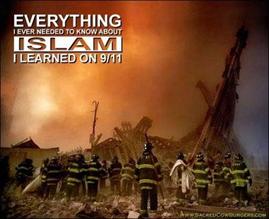 places of worship for
buddhists,
hindus, muslims and bahai’s) the Interfaith Ministries organization
has also generated numerous social action programs. places of worship for
buddhists,
hindus, muslims and bahai’s) the Interfaith Ministries organization
has also generated numerous social action programs.
Many of the
national interfaith organizations have now expanded programs into
global and sustainability issues.
The advent of the terrorist strike of
Sept 11, 2001 brought the
issue of fundamentalist islam sharply to the mind of Americans.
Religion had become dangerous - polarization deepened. Paradoxically
however, this has created even greater effort on the part of
christians, muslims and jews to communicate.
Their common root in
the biblical Abraham has been emphasized and study groups have been
set up to explore their similarities and differences.
In 2005, the third
Congress of World Religions was convened in
Montreal. Over 1800 people from 80 nations attended. Although
earlier Congresses had been held (The Parliament of World Religions,
in Chicago 1893 and in 1993) this one was specifically stimulated by
the rise of fundamentalist terrorism. Fundamentalism can be found in
any of the world religions. Its simplistic and concrete thinking
comes from fear.
It is expressed as “My God is better than your
God!."
The religious leaders stressed the growing need to move beyond
this rigid identification. They spoke of how the alienation, and
demonizing of the Other which arises from this belief, is counter to
spirituality itself.[14]
While the greening edge of religious thought expressed in Montreal
is well ahead of those in the more traditional churches, synagogues
and mosques it is of interest to those of us in Exopolitics. It
points to an opening in the collective psyche… an opening, which will
require greater flexibility from our religious institutions and
greater internal tensile strength from us as individuals.
While
retaining loyalty to our spiritual preference we are being asked to
respect another’s path to meaning. The growing interfaith impulse to
reach out and understand “the Other” has wider potential; it has
implications for disclosure.
Religion is a remarkable platform for public education. Through the
mounting pressure for interfaith dialogue we are being moved to
think of things beyond “this or that” to the more inclusive “this
and that.” This shift from dualistic to integral processing is a
step towards greater personal maturity. It represents balancing left
brain discernment with right brain holistic considerations.
It is
one more catalyst in our development.
3 (iii) Religion and Spirituality
While this interfaith ferment has been going on in American
religious structures, there is also the overall trend within the
general population of less interest in religion but more in
spirituality.
This has been defined as,
“the web that holds one’s
life together and connects it to something larger. It is both the
way we understand who we are in relationship to the world and others
and the practices we engage that allow us to feel connected, part of
something beyond us, a sense of inner coherence.” [15]
So there is a
growing appreciation of the commonality and subtleties of
spirituality.
With the internet, new perspectives from quantum theory, advances in
cloning and rising climate change, the religious beliefs in America
are being strongly challenged.
In the remarkable DVD series
Beyond
Theology, the forerunners of contemporary religious thought (Huston
Smith, Karen Armstrong, James Forbes, Sister Joan Chittister, Bishop
John Shelby Spong and others) are presenting a new vision.
They
state that if religion can be viewed as the cultural finger pointing
to God, then preoccupation with the finger (i.e. the rites, rituals
and rules of the religious institutions) may now present a danger;
it has now become too concrete. At times of crisis and cultural
change, flexibility is essential.
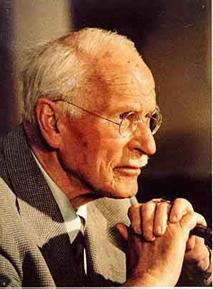 This fixation on “the finger”
could also become an obstacle for actual spiritual experience.[16] This fixation on “the finger”
could also become an obstacle for actual spiritual experience.[16]
In the Beyond Theology series, those interviewed say we need to go
deeper and focus on the basic quest for truth about the ultimate
notion of reality. The perennial wisdoms (those found anywhere and
at any time) need to be reconsidered in the face of all the modern
issues.
The work of Carl Jung is particularly important here.
Jung, in his
extensive studies of world religions and practices, said that
religion was one of the most universal expressions of the human
mind. This inner dynamic agency has touched all of our historical,
political and social expressions. It is inherent, real and neglected
at our peril.[17]
Jung wrote that it was important to separate this
spiritual agency from any particular creed for it would get codified
in many forms. Mankind would be continually dismantling one form in
the effort to find this inner essence.
Thus, protestants renounced catholicism, but then sought security in biblical scriptures. The
more literal forms of the bible have now been bypassed by those
looking for the essential meanings in this historically constructed
work.
Evolution continues in America. In early colonial days the
christian
churches were focused on God the father; however this shifted around
1830 to the more relational teachings of Jesus. In recent years this
has changed again for some denominations to greater emphasis on the
holy ghost.[18] This concept is conceived as the living creative
pulse within the Universe. The image of the supernatural parent
father is fading and being replaced by a more abstract sense of
Presence throughout the Universe.[19]
Similarly, individuals go through stages in their spiritual
evolution.
Scott McLennon, the University chaplain at Stanford
University, notes that many young people are spiritual seekers but
looking for a new conception of God, either in Nature or through
personal experience.
They intuitively reject the exclusivity of
religion and are seeking a deeper truth. Many are accessing the
personal God through meditation, a practice that has seen a steady
increase since the 1960s. The expansion of deep personal inquiry in
the country is remarkable and is leading many of the young toward
the multidimensional worlds.[20]
The leading spiritual thinkers cited in the
Beyond Theology series
point to this continuing evolution in spiritual thought.
It is
summed up in the words of Sister Joan Chittister…,
“Religion wakes us
up to the consciousness of the Universe. We have a role to play in
its on-going evolution. We are seeking a spirituality of
co-creation.” (20)
4.
Extraterrestrial Aid - Helpers and Watchers
Is there any convergence between the evolving ideas of the
religious, spiritual and philosophical leaders and what we have
received from the helper and watcher extraterrestrials?
Salla and
Lamiroy have described the “helper” extraterrestrials as those who
show respect for humans, do not abduct, and share information
through telepathic communication.
-
The “helpers” support a spiritual
earth culture and are concerned with the environment and global
transformation.
-
The “watcher” extraterrestrials, on the other hand,
are more removed and provide a perspective of the larger picture of
evolution within the solar system and the galaxy.
They are also
concerned with the spiritual evolution of mankind and our need for
greater awareness of the political, financial, and spiritual
challenges that we face. They bring knowledge of the many levels and
frequencies of life here and the great sweep of galactic movements.
While the evidence for this information is less convincing than
other ET material, both authors feel that it is worth
considering.[21]
Salla and Lamiroy want us to discern whether the activity of these
ETs is prescriptive or catalytic.[22] If these visitors are here to
help us grow and bring ourselves into balance with the earth, how
directive are they? The danger in the extraterrestrial prescriptive
approach is that we could project too much authority on them and
lose our capacity for discrimination. We would dis-empower ourselves
and make a god of the extraterrestrials.
This concern ties directly to the questions on
religion.
Jung, notes
that the inner spiritual agency (which is innate though not always
developed in mankind) arises because in the psyche there lives a
more impersonal Other. He called it the Self.
In the process of
maturing, our ego develops communication with this aspect. It is the
“still small voice in the night”; it is that which prompts our
mission in life, our choices and stirs the challenges by which we
become the person we were meant to be. It also has access to the
values of eons of human experience, the Golden Rule and the
perennial wisdoms. This inner relationship of our ego to the Self
steadies the psyche.
Symbols of the Self often appear in dreams as the old wise man/
woman or other images that are lighted or numinous.
This ego-Self
dialogue is the place were our power issues become connected to our
moral perspectives; where Logos meets Eros. It is the place where we
find our right use of will. The challenges we face will require a
high degree of personal responsibility. This theme is echoed in both
the evolution of our own psyche and the emerging thought from the
liberal religious institutions. It is also present in the most
thoughtful messages we have received from the helper and watcher
extraterrestrials.
We will also need to have a high degree of personal awareness to
distinguish the messages from this inner essence (the Self) and
those we may receive from extraterrestrials. We will have to be
conscious enough to hold to our own truths and not project them onto
any visitor. That being said, we can examine the information we
receive to decide whether it is valuable. Some information feels
right, whether it is prospective or catalytic.
For example, here are
a few of the Pleiadian principles of spirituality reported by
Meier:
-
Through deep mediation one can connect to a spiritual essence,
from which all things can be known. This essence is to be found in
all other humans. Evolution requires that one attune to Source and
its principles through one’s essence which is of the same quality.
-
There is no split between the worldly and the spiritual.
Consciousness is in everything, enlivens everything. The physical
plane of existence and the fine matter plane of existence exist
simultaneously in the same place, but in different dimensions, by
virtue of vibration.
-
Earth’s religions, which were originally helpful as guidelines
for daily living, are now a hindrance to man’s spiritual growth. For
the majority of humans they deepen a belief in an external
authority. Many are “following the lamp not the light.” Projecting
all value on an external image inhibits one from finding the
spiritual essence within.[23]
There is coherence here, both with Jung and the greening edge of
religion. All are pointing to our over-identification with “the
lamp” or “the pointing finger” within our religions.
Our psyches
become strongly invested in the symbols, imagery and rituals that
have been created. While these need to be honored, it is the essence
behind them that is important. Because we are so attached to these,
however, anything which challenges them will be experienced as
attacking the human inner spiritual agency itself and strongly
resisted.
Freer in “From Godspell to God Games” has stressed that a huge
blockage to disclosure will be the issue of our genetic origins,
interwoven as it is with extraterrestrials.[24]
There is a big
difference between the idea of being designed genetically by aliens
and the biblical picture…
“So God created man in his own image and
gave him dominion over the earth…”
How can Exopolitics find a wise
strategy within the highly sensitive and dynamic field of religion?
5.
Implications for Exopolitics
-
Planning: Exopolitics needs now to engage in some thoughtful
planning about how disclosure will be received by religious
institutions, particularly in the West. This should be done in the
light of the recent trends of increased secularization, increased
liberalization, greater polarization, and a trend toward interfaith
communication.
-
Timing: With the growing pressure for disclosure, we can
anticipate at some time in the next five years public awareness will
be tipped towards this issue. When this happens the religious
institutions will begin asking questions.
-
Entry: There is an old adage that says
when you are discussing
a heated subject start were the other is “at” (Eros). This suggests
one doesn’t begin with all the implications of extraterrestrials. It
does suggest that one validates the fundamental reality of mankind’s
deep desire for spiritual connection with the Other (whether that be
termed the Source, God, Allah, or Universal Mind
).
-
Focus: There is emerging a contingent of liberal thought in a
number of religious and philosophical movements. Within these
organizations there are “cultural creatives” who can be identified.
These are people who are the “trim tabs,” points of effective
change. The openness of Generation X and Y also needs to be kept in
mind.
-
Programs: The Exopolitics Institute could prepare a DVD (45-60
minutes maximum) which might be used in small group discussions.
This DVD would contain the best possible synopsis of evidence from
the most credible UFO witnesses. It would then be available to those
in liberal, ecumenical and interfaith organizations who have been
previously identified.
A cadre of individuals within the Exopolitic community could also be
found who would search out local community contacts. Effort could be
made to offer a one-time workshop on spirituality and
extraterrestrials to these local churches, synagogues and mosques.
Hopefully, this intervention might stir interest for further
discussion and the need for an awakened citizenry, making informed
choices, would become evident.
Conclusions
It’s time for Exopolitics to begin the discussion on
extraterrestrials and religions; Freer is right.
The UFO community
is continually deepening its own education, or, as Moulton-Howe
has
said, filling in the dots of the pointillism painting. However,
given the increasing world-wide interest in the topic we must now
find a way to broaden the discussion.
When the liberal religious institutions realize that the basic
spiritual dynamic within humankind will be acknowledged and valued,
perhaps they will be more receptive. This could be especially true
if they are presented with the role that higher consciousness can
and needs to play in ‘the real world if you can take it.’
Drawing on
their natural interests, strengths and potential would be the wise
way to go.
ENDNOTES
[1] Salla, M.E., “Exopolitics:
Discipline of Choice for Public Policy Issues Concerning
Extraterrestrial Life,” Exopolitics Journal 2:4 (July 2008).
[2] Post dated March 29th-2009
[3] Major Religions of the World Ranked by Number of Adherents:
Google.
[4] Gary, J: Ten Global Trends in Religion: http:www.wrf.org/cms/tentrends.shtml
[5] Bassett, S. “The Exopolitic Revolution: Disclosure as a
Cosmic Birthing.” Exopolitics Conference: Earth Transformation,
Hawaii, 2007.
[6] Salla, M.E. and Lamiroy, M., Lecture 13,
Exopolitcs-101-spring-09, (pg 7).
[7] Gary, J: Ten Global Trends in Religion: http:www.wrf.org/cms/tentrends.shtml
[8] Bassett, S. “The Exopolitic Revolution: Disclosure as a
Cosmic Birthing.” Exopolitic Conference: Earth Transformation,
Hawaii, 2007.
[9] Harris, P. “The Vatican Officially Proclaims that
Extraterrestrial Life Most Probably Exists!“ Fate Magazine (July
20th 2008).
[10] “Trends in Attitudes Toward Religion and Society” (Pew
Research Center Publications, 2007). http:pewresearch.org/pubs/614/relgion-social-issues.
[11] Religion Newsletters: http:www/masecure.org/guide/trends.html
[12] Hargrove, T. and Stempel, G.H., Poll probes Americans’
belief in UFOs and Life on other planets. http://www.reporternews.com/news/2008/ju/26/you-are-not-alone/
[13] Ecumenical Movement: http:encyclopedia2.the
freedictionary.com/ecumenical+movement.
[14] Rosen, D. Beyond Theology/ Dave Kendall, Producer KTWU/Channel
11 Topeka, Kansas, 66621 U.S.A. www.beyondtheology.tv/ktwu.washburn.edu
[15] Brown, D. http://www.futurist.com/archives/society-and-culture-trends-in-american-religion/
[16] Beyond Theology: Dave Kendall, Producer KTWU/Channel 11,
Topeka, Kansas, 66621. U.S.A. www.beyondtheology.tv/ktwu.washburn.edu.
[17] Jung, C.G., Psychology and Religion, in Vol. 11, The
Collected Works (Bollingen Foundation, Princeton University
Press, 1969).
[18] Prothero, S. Beyond Theology series, op cit.
[19] Spong, J.S., Beyond Theology series, op. cit.
[20] McLennon, S., Beyond Theology series, op. cit.
[21] Chittister, J., Beyond Theology series, op. cit.
[22] Salla, M. and Lamiroy, M. Lecture 13, Exopolitics
Institute-101-spring 109.
[23] Andrade, G. Star Wisdom, Principles of Pleiadian
Spirituality (Gilliland Printing, Arkansas City, Kansas, 1997).
[24] Freer, N. “From Godspell to God Games”
|

 About the Author
About the Author
 2. The Global
Overview
2. The Global
Overview  term themselves secular: (i.e. atheist, agnostic or of
no religion.)
term themselves secular: (i.e. atheist, agnostic or of
no religion.)  places of worship for
buddhists,
hindus, muslims and bahai’s) the Interfaith Ministries organization
has also generated numerous social action programs.
places of worship for
buddhists,
hindus, muslims and bahai’s) the Interfaith Ministries organization
has also generated numerous social action programs.  This fixation on “the finger”
could also become an obstacle for actual spiritual experience.[16]
This fixation on “the finger”
could also become an obstacle for actual spiritual experience.[16]